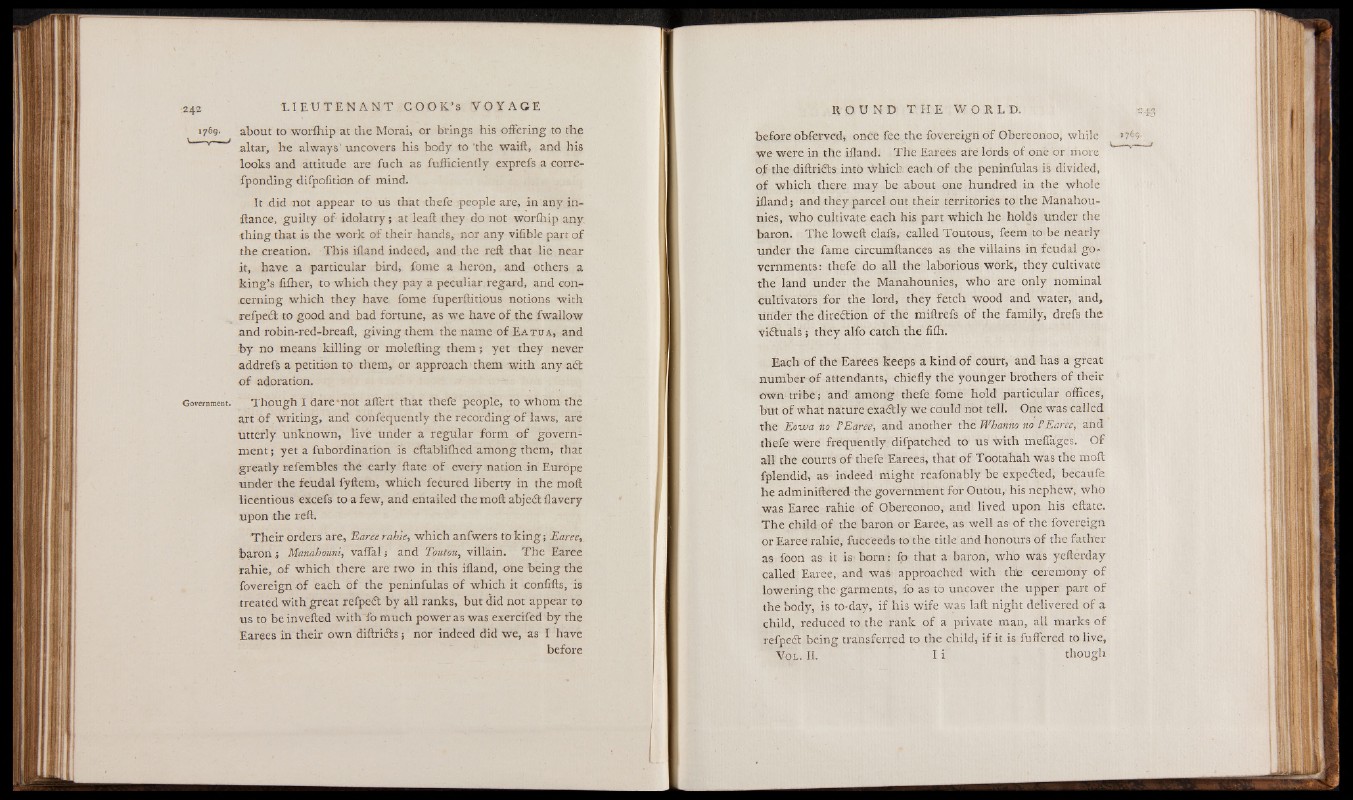
about to worlhip at the Morai, or brings his offering to the
altar, he always' uncovers his body to 'the waift, and his
looks and attitude are fuch as fufficiently exprefs a corresponding
difpofition of mind.
It did not appear to us that thefe people are, in any in-
ftance, guilty o f idolatry; at leaf! they do not worfhip any.
thing that is the work of their hands, nor any vifible part of
the creation. This ifland indeed, and the reft that lie near
it, have a particular bird, Some a heron, and others a
king’s fiffier, to which they pay a peculiar regard, and concerning
which they have fome fuperftitious notions with
refpeci to good and bad fortune, as we have of the fwallow
and robin-red-breaft, giving them the name of E a t u a , and
by no means killing or molefting them; yet they never
addrefs a petition to them, or approach them with any aft
o f adoration.
Government. Though I dare‘ not affert that thefe people, to whom the
art of writing, and confequently the recording of laws, are
utterly unknown, live under a regular form o f government
; yet a fubordination is eftablifhed among them, that
greatly refembles the early ftate o f every nation in Europe
under the feudal fyftem, which fecured liberty in the moft
licentious excels to a few, and entailed the moft abject flavery
upon the reft.
Their orders are, Earee rahie, which anfwers to k in g ; Earee,
baron; Manahouni, vaflal; and Toutou, villain. The Earee
rahie, of which there are two in this ifland, ohe being the
fovereign of each of the peninfulas of which it confifts, is
treated with great refpedt by all ranks, but did not appear to
us to be invefted with fo much power as was exercifed by the
Earees in their own diftrifts ; nor indeed did we, as T have
before
before obferved, once fee the fovereign o f Obereonoo, while
we were in the ifland. The Earees are lords of one or more,
of the diftridts into which each of the peninfulas is divided,
of which there may be about one hundred in the whole
ifland; and they parcel out their territories to the Manahou-
nies, who cultivate each his part which he holds under the
baron. The loweft clafs,- called Toutous, feem to be nearly
under the fame circumftances as the villains in feudal governments
: thefe do all the laborious work, they cultivate
the land under the Manahounies, who are only nominal
cultivators for the lord, they fetch wood and water, and,
under the direction of the miftrefs of the family, drefs the
victuals; they alfo catch the fifh.
Each of the Earees keeps a kind of court, and has a great
number of attendants, chiefly the younger brothers of their
own tribe; and among thefe fome hold particular offices,
but of what nature exatftly we could not tell. One was called
the Eowa no l’Earee, and another the Whanno no 1'Earee, and
thefe were frequently difpatched to us with mefiages. Of
all the courts of thefe Earees, that o f Tootahah was the moft
fplendid, as indeed might reasonably be expected, becaufe
he adminiftered the government for Outou, his nephew, who
was Earee rahie of Obereonoo, and lived upon his eftate.
The child of the baron or Earee, as well as of the fovereign
or Earee rahie, Succeeds to the title and honours o f the father
as foon as it is born: fo that a baron, who was yefterday
called Earee, and was- approached with the ceremony of
lowering the garments, fo as to uncover the upper part of
the body, is to-day, if his wife was laft night delivered of a
child, reduced to the rank of a private man, all marks of
refpect being transferred to the child, if it is fuflcred to live,
Vol. II. I i though